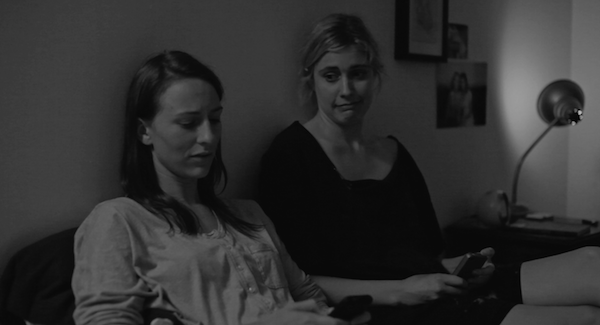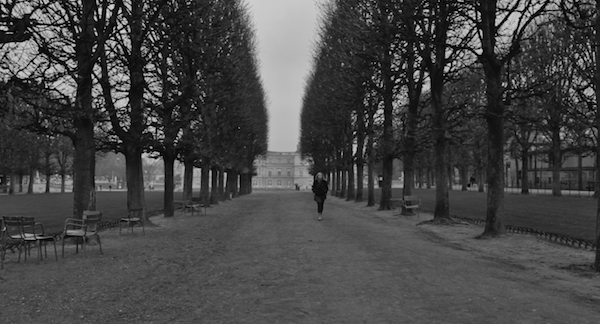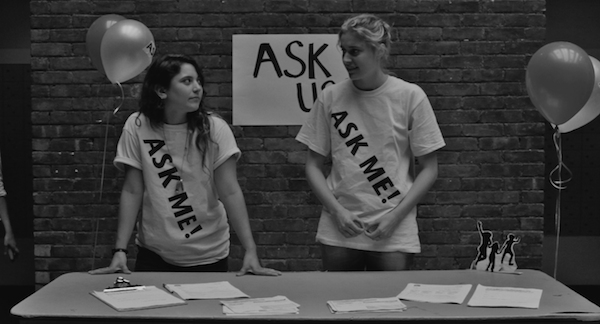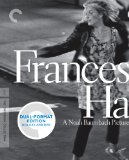| Reviews & Columns |
|
Reviews DVD TV on DVD Blu-ray 4K UHD International DVDs In Theaters Reviews by Studio Video Games Features Collector Series DVDs Easter Egg Database Interviews DVD Talk Radio Feature Articles Columns Anime Talk DVD Savant Horror DVDs The M.O.D. Squad Art House HD Talk Silent DVD
|
DVD Talk Forum |
|
|
| Resources |
|
DVD Price Search Customer Service #'s RCE Info Links |
|
Columns
|
|
|
Frances Ha
The Movie:

A couple weeks ago, my girlfriend emailed me a link about a Finnish word, "myötähäpeä." The website she linked to defined the word as "the feeling of shame you experience on behalf of another person or a character when they do something stupid or embarassing." She sent me this because I frequently suffer from myötähäpeä when watching TV and movies. I will get physically uncomfortable and leave the room if I am watching with someone else; I will have to shut it off, take a breather, and return later if I am watching alone. Of course, something that is designed to be cringe-inducing, like The Office, will get me more easily, but it doesn't always have to be so intense to do the trick.
Long story short: I had to shut off Frances Ha three times while watching it.
Following up the often awkward and uncomfortable Greenberg, director Noah Baumbach reteams with actress Greta Gerwig (who also co-scripted) for an incredibly well-observed portrait of post-collegiate arrested development in New York City. Frances (Gerwig) is an apprentice in a dance company who lives with her best friend from college, Sophie (Mickey Sumner). Life is good for Frances -- even when she breaks up with her boyfriend -- because she always has Sophie.
Except... well... it turns out Sophie has decided to ditch Brooklyn for Manhattan and share an apartment with someone else. And now, Frances is alone. From there, the film unfolds in a number of episodes where Frances finds herself in a number of living situations -- all delineated in the film by title cards with each new residence's mailing address.
Frances single-mindedly wants to get Sophie back, like in a romantic comedy, while also finally securing a real permanent spot in the dance company. Meanwhile, reality constantly sends her messages that this is not going to happen. But, Frances is not only stubborn, she has a willingness to plow into situations and interactions head-first, hoping for the best, social cues and other mores be damned (hence my myötähäpeä). At one point, Frances asks another dancer, Rachel (Grace Gummer), to play-fight with her (like Sophie would). Rachel has no desire to do so, but Frances goes ahead and attacks her face. This is moments after Rachel has agreed to let Frances crash on her couch for a few weeks.
Frances Ha returns Baumbach to the hyper-articulate but believable and relatable twentysomething world of his debut, Kicking and Screaming. In fact, as a New Yorker who feels like he is in a state of post-collegiate arrested development, Frances Ha is probably the most shockingly familiar movie I've seen since Andrew Bujalski's Mutual Appreciation. Not that these films are telling my whole life with their words, but they nail down essential details -- especially Frances Ha -- that perfectly captures their milieu. There is a scene where Frances needs cash to pay for the dinner she just invited her friend to share. She runs out of the restaurant, and is forced to scramble across blocks and blocks before she finds an ATM. As she makes her withdrawal, she is confronted with a three-dollar surcharge, which she seriously thinks about before relenting and accepting the fee. Then, she is forced to run back to the restaurant. Not only is that a great character moment, but it is uncannily real. The exact same thing happened to me last week.
Baumbach and his cinematographer Sam Levy shot the movie with Canon 5D digital cameras, which was then converted to black-and-white. This approach echoes the look of Woody Allen's Manhattan and the early New York-set films of Jim Jarmusch, but as the inclusion of old music cues by Georges Delerue make clear, Baumbach is in a French New Wave state of mind (again). He even sends Frances to Paris for a misbegotten weekend, as if to retrace the steps of his cinematic heroes by shooting on those city streets.
While filled with a lot of cringe-y moments, Frances Ha is actually quite a warm and lovely film, with an optimistic view of its heroine. It might take her almost the entire running time of the film to accept what the world has to offer her, but, by the end, she seems to be on the right track. Gerwig has played roles not unlike this before (last year's Lola Versus comes immediately to mind), but she infuses Frances's character with an attitude of commitment and determination that she's left previously unexplored. Even when she's making any number of bad decisions, Frances remains a magnetically watchable presence. That's certainly why I returned to the film after shutting it off for the third time.

The Blu-ray
Frances Ha is one of Criterion's new dual format releases, which includes both the BD and the DVD overlapped inside the case, and a slim (for Criterion) booklet that includes an essay on the film by Annie Baker and the usual technical info and photos.
The Video:
Frances Ha comes in a 1080p AVC-encoded 1.85:1 presentation. From a technical standpoint, it's a little hard to appropriately assess. Shot on the Canon 5D and converted to black-and-white, the film often convincingly looks like film. It is nice and silvery, often sporting deep rich blacks and a nuanced midrange. However, the image is noisy as hell, most often in the indoor scenes where there are a lot of blank white walls. On the other hand, most of the exteriors are nice and detailed, with good separation. It's hard to fault the film for this, when the filmmakers discuss in the supplement "Interpreting Reality" (see below) that they were well aware of the video noise and spent time in post-production manipulating the noise to give them the particular look they wanted. I spot-checked the enclosed DVD, and all instances of what I thought might be AVC encoding errors on the Blu-ray were present in the DVD output too, so they came from the source and were most likely intentional.
The Audio:
The English DTS-HD MA 5.1 is clear and free of problems, if not very dynamic. As you come to expect with a talky movie, the rear speakers don't get much usage except during the music cues, like David Bowie's "Modern Love," which underscores a wonderful sequence where Frances runs and dances through the streets of Chinatown. There are also English SDH.
Special Features:
While a Gerwig/Baumbach commentary on Frances Ha seems like it would be the perfect supplement, the filmmakers took a pass on that one are instead interviewed in a pair of brief featurettes.
- Peter Bogdanovich and Noah Baumbach (HD, 15 mins.) - The filmmakers, who first worked together when Bogdanovich played a role in Baumbach's 1997 comedy Mr. Jealousy, discuss the origins of the film, the use of black-and-white, the use of music, and other production topics. While they touch on a lot of interesting ideas, it feels like they only scratch the surface.
- Sarah Polley and Greta Gerwig (HD, 17 mins.) - Actress-director Polley comes off as a big fan who tries to explore Gerwig's experiences of the film, from the position of a colleague. The best revelation is that Gerwig took inspiration for her performance from David Thewlis in Naked. This makes a lot of sense, because while Frances has none of that character's sadism, Gerwig invests a similar intensity and fearlessness into her performace of the role.
- Interpreting Reality (HD, 18 mins.) - This was actually the most interesting featurette for me. It involves Baumbach, cinematographer Sam Levy, and color grader Pascal Dangin discussing the discovery of the look of the movie. They recount collaborating with the late Harris Savides (who shot for David Fincher and Gus Van Sant, in addition to Baumbach) on a number of tests with the 5D camera a year before they would actually shoot the movie, and how they eventually found a way to use the technology and manipulate the footage to create a visual style they were pleased with. The collaborators seem genuinely excited recounting the process of discovery and refinement. It's a cool little piece.
- Theatrical Trailer (HD, 2 mins.)
Final Thoughts:
While you may not personally relate to the pseudo-boho New York lifestyle of the characters, I expect you'll be able to empathize with Gerwig's performance and laugh... even when it doesn't feel appropriate. Recommended.

Justin Remer is a frequent wearer of beards. His new album of experimental ambient music, Joyce, is available on Bandcamp, Spotify, Apple, and wherever else fine music is enjoyed. He directed a folk-rock documentary called Making Lovers & Dollars, which is now streaming. He also can found be found online reading short stories and rambling about pop music.
|
| Popular Reviews |
| Sponsored Links |
|
|
| Sponsored Links |
|
|
| Release List | Reviews | Shop | Newsletter | Forum | DVD Giveaways | Blu-Ray | Advertise |
|
Copyright 2024 DVDTalk.com All Rights Reserved. Legal Info, Privacy Policy, Terms of Use,
Manage Preferences,
Your Privacy Choices | |||||||













